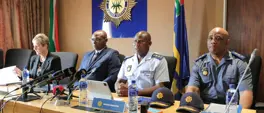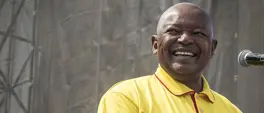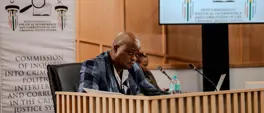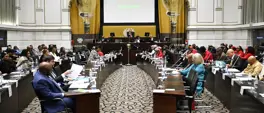CHARLES MATSEKE | Mogotsi vs Mbalula: ANC mutually assured distraction
Charles Matseke
8 October 2025 | 8:56"What the Mogotsi–Mbalula saga ultimately reveals is not merely corruption or factionalism but a new logic of politics itself. In a system where every player is compromised, survival depends on distraction. Scandal becomes theatre; exposure becomes strategy."

African National Congress (ANC) secretary general Fikile Mbalula on a National Working Committee visit to the Western Cape on 20 July 2025. Picture: X/ @MYANC
“When elephants fight, it is the grass that suffers.”
The proverb captures the current debacle between Brown Mogotsi and Fikile Mbalula two political animals locked in a performative duel whose fallout extends far beyond their egos.
What appears as a spat between comrades is, in truth, a case study in game theory and self-destruction, an encounter driven not by ideology but by mutually assured distraction: each man weaponising exposure, each seeking survival through spectacle.
Mbalula, the ANC’s Secretary-General, struck first lashing out at Mogotsi for alleged opportunism and proximity to questionable business networks, including Vusi “Cat” Matla and Minister Senzo Mchunu. Mogotsi retaliated with an unrestrained exclusive interview with the SABC, dripping with wounded pride and veiled threats.
In any functioning democracy, such exchanges might be dismissed as political theatre. In the ANC’s internal ecosystem, however, reputational combat is existential.
Power is not maintained by ideas but by perception and perception is managed through intimidation scandal, and narrative control. When Mbalula sought to destroy Mogotsi’s credibility, he triggered a non-cooperative game where both players’ payoffs diminish with every move.
Like the Cold War doctrine of Mutually Assured Destruction (MAD), both men now hold nuclear secrets: each capable of obliterating the other’s legitimacy, yet aware that total war ensures mutual ruin. In this equilibrium of fear, the strategy is not to win, but to distract, to shift public attention away from structural decay and towards personal drama. It is mutually assured distraction: scandal as survival.
Mbalula’s assault on Mogotsi was not only impulsive; it was strategically suicidal. The attack invited Mogotsi’s counter-offensive, exposing the ANC’s underbelly where political loyalty and criminal enterprise are intertwined. In that sense, Mbalula misread the board: he assumed dominance in a zero-sum game, forgetting that his opponent, like him, holds “kompromat”.
Mogotsi’s rebuttal peeled back layers of intrigue surrounding the ANC’ upper structures implicating familiar ghosts from the Zuma era and suggesting that corruption, far from being an aberration, is the system’s organising principle.
The timing is catastrophic.
• The 2026 Local Government Elections are within view, with the ANC’s urban base collapsing.
• The National General Council (NGC) later this year will likely mutate into a factional war over policy, funding, and succession.
• And the 2029 General Elections already cast a long shadow, a potential reckoning for a liberation movement on the edge of financial and moral insolvency.
Mogotsi’s behaviour signals something crucial, he does not intend to die alone. Like Zuma before him, he is invoking the logic of deterrence the politics of “if I fall, everyone falls.” That doctrine, once used to preserve the balance of power, has become the currency of blackmail within the ANC.
Behind the shouting match lurks a darker reference. The 2015 assassination of businessman Wandile Bozwana shot nine times at Pretoria’ Garsfontein off-ramp.
Convicted in the case was Vusi “Khekhe” Mathibela, a man whose name resurfaced in Mogotsi’s rebuttal when he reminded the public that Mbalula had allegedly met both Bozwana and Mathibela less than 72 hours before the murder.
Though Mbalula was never charged, the timing of Mogotsi’s reference was no accident. It was a calculated move a warning shot. In game-theoretic terms, he raised the cost of retaliation by signalling that he too possesses incriminating knowledge. His message to Luthuli House was clear: “If you isolate me, I will take the house down with me.”
This is the heart of the ANC’s contemporary existential crisis: exposure as defence. Information once the weapon of accountability is now the currency of immunity.
Every faction holds files, every cadre guards secrets. The result is paralysis: an organisation where truth is too dangerous to tell and silence too costly to maintain.
While Mogotsi and Mbalula exchange blows, the ANC itself faces an existential implosion. The Sheriff of the Court has attached party assets to recover R85 million owed to Ezulwini Investments, a debt incurred during Mbalula’s tenure as Head of Elections.
Luthuli House stands on the brink of symbolic foreclosure. Vehicles, office furniture, even provincial equipment have been seized the material embodiment of a moral bankruptcy long denied.
A party unable to pay its staff or fund its elections cannot credibly claim to rebuild a nation. The patronage networks that once glued the movement together are drying up. Donors are fleeing; branches are collapsing. Without money, the ANC cannot buy loyalty and without loyalty, it cannot survive.
As in game theory’s “stag hunt” scenario, cooperation among cadres only holds when resources are plentiful.
Once scarcity sets in, rational playersdefect seeking individual safety over collective survival. The result: cannibalism masquerading as strategy.
Under its own Constitution, both Mbalula and Mogotsi’s conduct would constitute bringing the organisation into disrepute. Yet no disciplinary measures have been taken a striking contrast to past expulsions of Carl Niehaus or Ace Magashule for lesser offences.
This selective enforcement signals what political theorists call a loss of credible commitment: rules that apply only to the weak lose legitimacy entirely. Internal discipline has become performative deployed to settle factional scores, not to preserve ethics. In the absence of enforceable norms, chaos becomes equilibrium.
Mogotsi’s accusation that Mbalula seeks to undercut the Senzo Mchunu–Patrice Motsepe axis offers another lens through which to read this drama.
Whether true or not, the claim positions Mbalula as a disruptor of an emerging elite realignment one aimed at securing Ramaphosa’s post-presidential safety through continuity.
By this reading, Mbalula’ attacks are pre-emptive strikes deterrence by humiliation. But by dragging these rivalries into public view, he has achieved the opposite: he has confirmed the ANC’s implosion as a rational outcome of its own incentives.
Each faction is now a rational actor pursuing survival in a collapsing system. No one can afford moral high ground when exposure means extinction.
While the titans of the movement trade threats, the country bleeds.
• Unemployment remains above 32%.
• Service-delivery protests surpass 4 000 annually (Civic Protest Barometer 2024).
• Public trust in political institutions has cratered to 26% (Afrobarometer 2024).
• Load-shedding persists, draining GDP and public patience alike.
Against this backdrop, the ANC’s internecine warfare feels grotesquely detached a choreography of ego while the social contract disintegrates.
Theproverb returns with brutal clarity: when elephants fight, it is not the elephants who perish, but the grass.
What the Mogotsi–Mbalula saga ultimately reveals is not merely corruption or factionalism but a new logic of politics itself. In a system where every player is compromised, survival depends on distraction. Scandal becomes theatre; exposure becomes strategy.
This is Mutually Assured Distraction, a perfect equilibrium where each actor’s best response is to create noise so deafening that no truth can be heard. The ANC is no longer imploding through ideology or opposition; it is collapsing through informational overload a self-inflicted fog where accountability evaporates.
In The 48 Laws of Power, Robert Greene warns: “Never appear too perfect.” In the ANC, imperfection is no longer a flaw but a shield the more tainted you are, the safer you become, for to prosecute one is to expose all.
Thus, Mogotsi and Mbalula are not aberrations; they are symptoms of a system where political rationality has turned inward, consuming itself. Their feud is not a scandal; it is a mirror.
Game theory tells us that when cooperation breaks down, all players lose. South Africa now watches a ruling party trapped in a self-inflicted prisoner’s dilemma too corrupt to reform, too exposed to collapse, too divided to govern.
Unless the ANC restores credible accountability within its own ranks, it will not fall by revolution but by corrosion not by external overthrow but by internal rot.
And when that collapse comes, it will not be the elephants who suffer.
It will, once again, be the grass the citizens of a republic held hostage by its own liberators.
Charles Matseke (MPhil in Politics and International Relations) is a researcher and writer with a keen interest in contemporary political dynamics. His research focuses on electoral politics, foreign policy analysis, and international relations, with a particular emphasis on the Global South and Africa's role in global affairs.
Get the whole picture 💡
Take a look at the topic timeline for all related articles.
Trending News
More in Opinion

3 March 2026 11:40
Who belongs in South Africa? UCT philosopher weighs in on identity and ownership

2 March 2026 11:05
TLALI TLALI |Mandate, money and accountability - What the government website debate really reveals

27 February 2026 11:00
JAMIL F. KHAN | Human rights last on the list for global leadership agenda













